Looking for the best backup solar generators of 2024? You can't go wrong with the EF ECOFLOW DELTA2, offering rapid charging and a versatile power output. The EF ECOFLOW RIVER 2 Max is perfect for portability and can handle multiple devices. If you need something lightweight yet powerful, the EF ECOFLOW RIVER 2 Pro fits the bill. For those on a budget, consider the Jackery Solar Generator 1000, known for its efficient charging. Finally, the EF ECOFLOW DELTA 2 Max can support nearly all household devices. Want to discover which model suits your needs best?
EF ECOFLOW Solar Generator DELTA2 with 220W Solar Panel
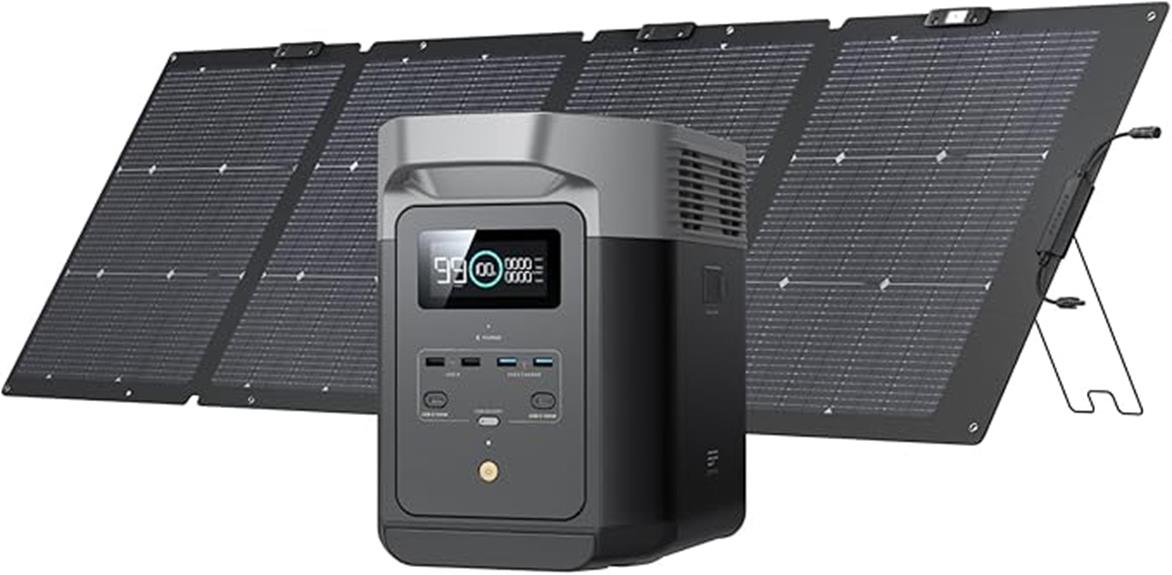
The EF ECOFLOW Solar Generator DELTA2 with 220W Solar Panel is an excellent choice for anyone who values reliability and efficiency in their backup power solutions. With a robust LFP battery offering over 3,000 charge cycles and a capacity of 1024Wh, this generator is built to last. I love how quickly it charges—up to 80% in just 50 minutes via AC input. It's perfect for camping or emergencies, powering up to 90% of household appliances. Its 15 outlets, including USB-A and USB-C, make it versatile for all my devices. Plus, with the option to expand its capacity from 1kWh to 3kWh, it adapts to my needs. The solid construction and user-friendly app add to its appeal!
Best For: Those seeking a reliable, portable power solution for camping, RV trips, or emergency home backup.
Pros:
- Fast charging capability, reaching 80% in just 50 minutes via AC input.
- Versatile output options with 15 outlets, including USB-A, USB-C, and 12V ports.
- Expandable capacity allows for increased power needs, from 1kWh to 3kWh.
Cons:
- Higher initial cost compared to traditional generators.
- Weight may be a concern for some users looking for ultra-portability.
- Limited solar input of up to 500W may not suit all solar panel setups.
EF ECOFLOW RIVER 2 Max Portable Power Station with Solar Panel
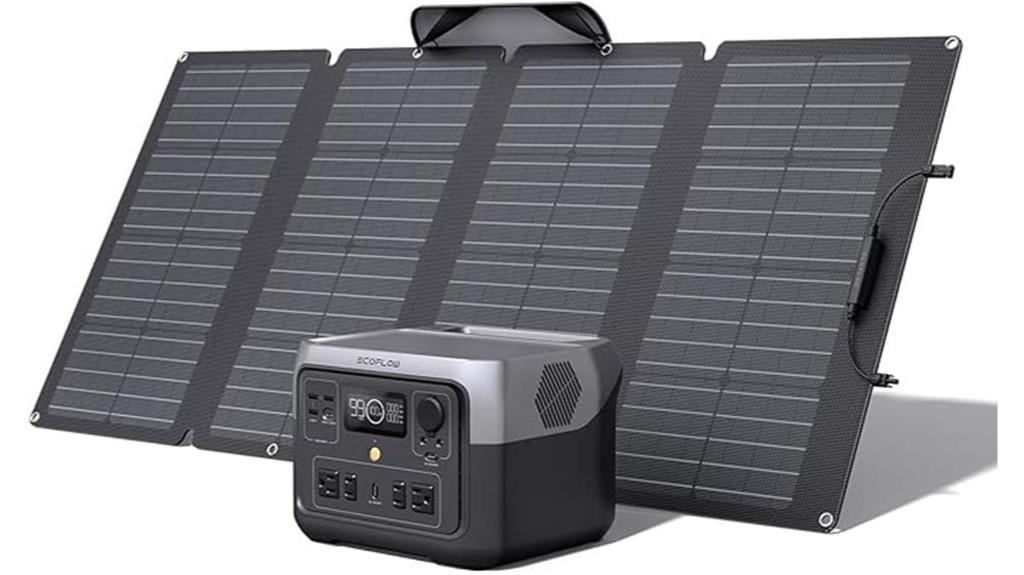
Looking for a reliable power source for your outdoor adventures or emergency backup? The EF ECOFLOW RIVER 2 Max Portable Power Station is a game-changer. With a capacity of 512Wh and the ability to output up to 1000W, it can power up to 11 devices simultaneously. I love that it charges fully in just 60 minutes via AC outlet or in about 4 hours with a 160W solar panel. Plus, the LiFePO4 battery lasts over 3000 cycles, so it's built to last nearly a decade. Its lightweight design makes it perfect for camping, and the weatherproof solar panel is durable enough for the outdoors. Overall, it's versatile, efficient, and a cost-effective choice compared to other brands.
Best For: Outdoor enthusiasts, campers, and those in need of reliable emergency backup power.
Pros:
- Fast charging capability with AC outlet reaching full charge in just 60 minutes.
- Lightweight and portable design makes it easy to carry for outdoor activities.
- Long battery life with over 3000 charging cycles, ensuring durability for nearly a decade.
Cons:
- Some users reported connectivity issues with the app.
- It may not function as a true UPS for all devices.
- Limited power capacity might not support high-demand appliances simultaneously.
EF ECOFLOW RIVER 2 Pro Solar Generator
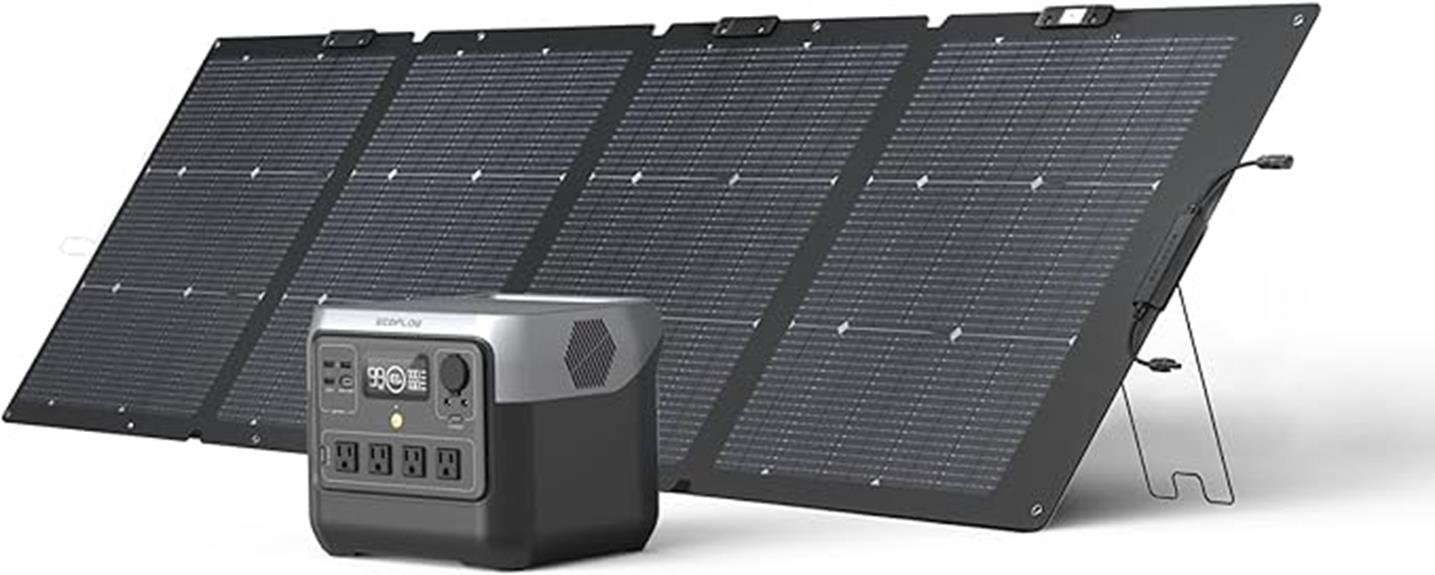
For anyone in need of reliable power while camping or during emergencies, the EF ECOFLOW RIVER 2 Pro Solar Generator stands out with its impressive 768Wh LiFePO4 battery and lightweight design. Weighing just 17.2 lbs, it's easy to transport, especially with its built-in handle. The 220W bifacial solar panel can recharge the unit in just 4.3 hours, generating up to 25% more energy. With 11 versatile outlets, including 4 AC ports, it can power 80% of household appliances, making it ideal for both outdoor adventures and home backup. I love the user-friendly interface and the EcoFlow app that provides real-time battery status. Overall, this generator combines efficiency, durability, and convenience, making it a top choice for reliable power.
Best For: Those seeking a reliable, portable power solution for camping, emergency backup, and home use.
Pros:
- Compact and lightweight design (17.2 lbs) with a built-in handle for easy transport.
- Quick solar recharge time of 4.3 hours with a 220W bifacial solar panel that generates up to 25% more energy.
- Versatile power options with 11 outlets, including 4 AC ports, capable of powering 80% of household appliances.
Cons:
- Limited to 800W output under normal conditions, which may not support larger appliances simultaneously.
- Requires additional units for expanded power needs, especially for high-consumption devices like electric kettles.
- The initial investment may be high compared to traditional generators.
Jackery Solar Generator 1000 with 2x 100W Solar Panels
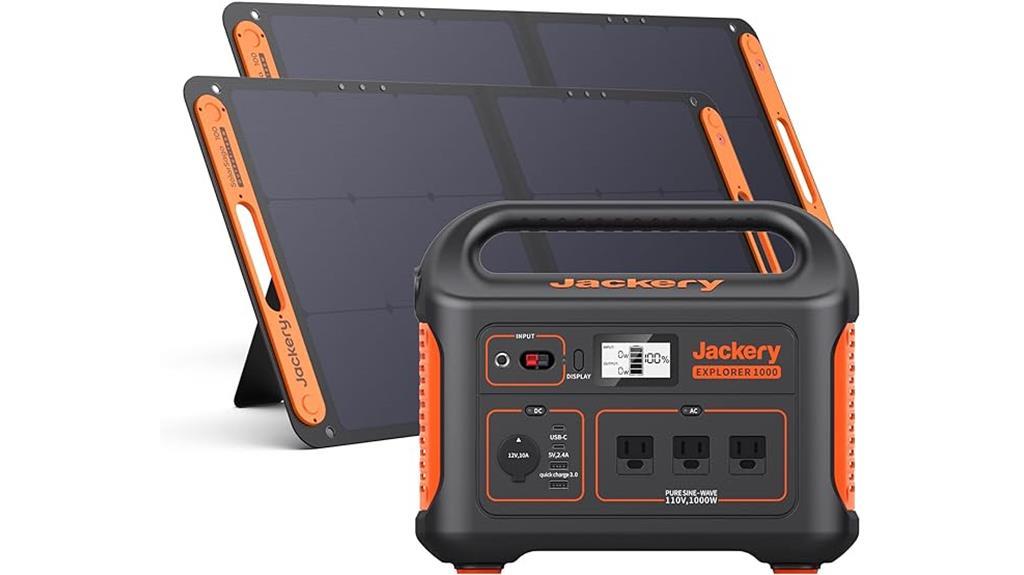
If you're someone who values reliability and efficiency in power solutions, the Jackery Solar Generator 1000 with 2x 100W Solar Panels could be your ideal companion. With a capacity of 1002Wh and three AC outlets, it powers 90% of home appliances, making it perfect for home backup or outdoor adventures. I appreciate that it fully charges in just eight hours with solar panels, and its smart MPPT controller guarantees peak efficiency. Weighing only 22 lbs, it's lightweight and portable, which is a huge plus for camping trips. The durable design and pure sine wave inverter protect my devices while operating quietly. Overall, users rave about its performance and quick charging, making it a solid choice for reliable power.
Best For: Those seeking a reliable and portable power solution for home backup, outdoor camping, or emergency situations.
Pros:
- High capacity and power output can support 90% of home appliances.
- Quick charging time of 8 hours with solar panels, ensuring you have power when needed.
- Lightweight design at only 22 lbs makes it easy to transport for outdoor adventures.
Cons:
- Fixed handle design limits stacking and storage options.
- Display screen requires manual activation to stay lit, which may be inconvenient.
- No larger 1500W model currently available to meet higher power demands.
EF ECOFLOW Portable Power Station DELTA 2 Max
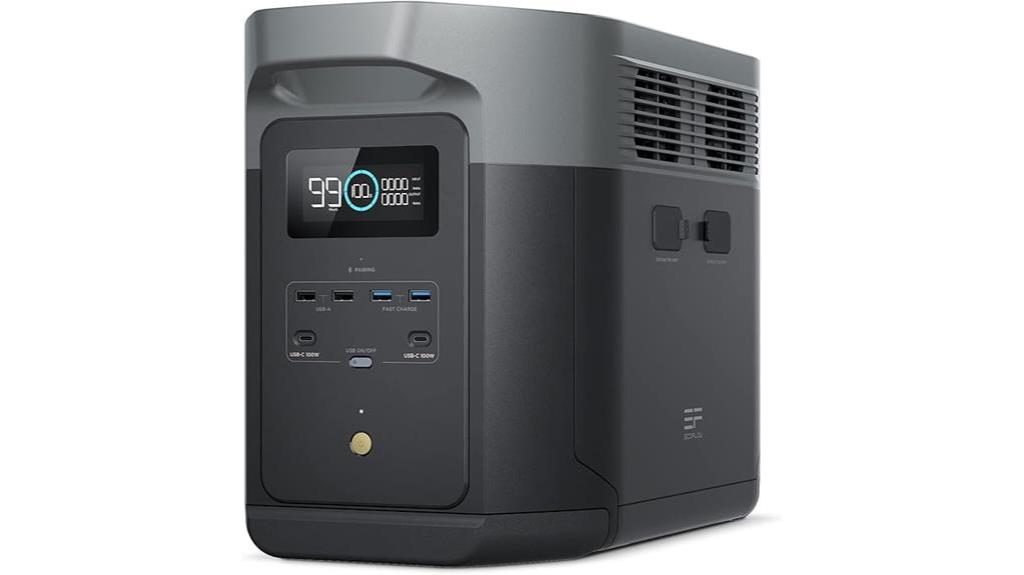
The EF ECOFLOW Portable Power Station DELTA 2 Max stands out as an exceptional choice for anyone needing reliable power on the go or during emergencies. With a powerful output of 2400W and an impressive capacity of 2048Wh, it can easily handle 99% of household devices. What I love most is its X-Boost mode, which allows it to reach up to 3400W, making it perfect for larger appliances. It charges quickly, reaching full capacity in just 1.1 hours via AC. Plus, with 15 output ports, I can power multiple devices simultaneously. The quiet operation and user-friendly LCD display make it a breeze to use, whether I'm camping or dealing with a power outage. This generator truly delivers!
Best For: Those in need of a versatile and powerful portable power solution for home backup, camping, or outdoor events.
Pros:
- High power output of 2400W, capable of handling 99% of household devices.
- Fast charging time, reaching full capacity in just 1.1 hours via AC.
- User-friendly design with a clear LCD display and 15 output ports for multiple devices.
Cons:
- The initial cost may be higher compared to traditional generators.
- Requires adjustment of solar panels throughout the day for optimal solar charging efficiency.
- Limited to a maximum of 6kWh capacity with additional batteries, which may not suffice for larger energy needs.
Factors to Consider When Choosing Backup Solar Generators
When you're choosing a backup solar generator, there are several key factors to keep in mind. You'll want to evaluate the power output capacity, charging options, and portability. Additionally, think about the battery lifespan and technology, as well as how versatile the generator is for your needs.
Power Output Capacity
Choosing the right backup solar generator hinges considerably on understanding its power output capacity. This capacity is typically measured in watts (W), indicating the maximum power the generator can deliver to devices simultaneously. If you want to power most household appliances, look for generators with a continuous output capacity of 1000W or above. Generators below this mark might only handle smaller devices like phones or lights.
Another key factor is surge capacity, which refers to the maximum power a generator can provide for a short period. This is vital for starting appliances with high initial power demands, such as refrigerators. Additionally, consider the total watt-hour (Wh) rating, which reflects the energy storage capability of the unit. Higher capacity models, like those with 2048Wh, support longer usage times for multiple devices.
To make an informed choice, assess both the continuous and peak power outputs. This will help you determine whether a generator can handle the specific power requirements of the devices you plan to use during outages or outdoor activities. Prioritize these capacities to guarantee you're well-equipped when you need power the most.
Charging Options Available
Understanding the power output capacity of backup solar generators is just one part of the decision-making process; charging options play a significant role too. When choosing your generator, consider the variety of charging methods available. Look for models with AC outlets that allow for rapid charging—some can fully recharge in under 1.5 hours. This can be a game-changer during emergencies.
Additionally, you'll want to explore solar inputs that accommodate various wattages, enhancing your ability to harvest solar energy efficiently. Models with pass-through charging capabilities are particularly useful, allowing you to power devices while the generator charges, ensuring you're never left in the dark.
Also, pay attention to solar panel compatibility. Some generators can handle high wattage solar panels of 500W or more, drastically cutting recharge times in ideal sunlight. Battery technology matters too; lithium iron phosphate (LiFePO4) batteries typically offer over 3,000 cycles, ensuring durability for frequent use. Finally, evaluate the overall charging time from both solar and AC sources to find faster options, which can be essential during unexpected power outages.
Portability and Weight
Portability and weight are critical factors to evaluate with backup solar generators, especially if you plan to take them on outdoor adventures or need a reliable power source during emergencies. When you're choosing a solar generator, check the weight; some models weigh as little as 17.2 lbs, while others can exceed 22 lbs. A lighter design enhances portability, often featuring built-in handles for easier transport—this convenience is invaluable for frequent movers.
Compactness is equally important for storage and transport. Many generators fit neatly in car trunks or RV compartments, ensuring you have easy access during camping trips or emergencies. You'll want a unit that's not just lightweight but also durable. Look for features like IP68 waterproof ratings to withstand outdoor conditions.
Battery Lifespan and Technology
Battery technology plays an essential role in the performance and longevity of backup solar generators. When choosing a solar generator, consider the type of battery it uses. Lithium Iron Phosphate (LiFePO4) batteries typically offer over 3000 cycles, markedly outlasting Nickel Manganese Cobalt (NMC) batteries, which provide around 1500-2000 cycles. If you expect to use your generator frequently, LiFePO4 is a better choice.
Additionally, think about temperature ranges. LiFePO4 batteries perform well in extreme temperatures, functioning effectively between -4°F to 176°F, while NMC batteries struggle in similar conditions. You'll want a generator that can handle your environment.
It's vital to avoid letting lithium-ion batteries drop to 0% charge for long periods, as this can shorten their lifespan and degrade performance. LiFePO4 batteries also excel in holding a charge, with the ability to maintain it for up to 350 days compared to 300 days for NMC.
Regularly monitoring battery health and using advanced battery management systems will help you optimize lifespan and guarantee safe operation during charging and discharging. Making informed choices about battery technology can greatly enhance your backup solar generator experience.
Versatility of Use
Evaluating the versatility of use is vital when choosing a backup solar generator, as it can greatly impact your experience and satisfaction. You'll want a generator that can power a wide range of devices, ideally supporting over 90% of household appliances like microwaves, refrigerators, and CPAP machines. Look for models with multiple output options—AC, USB, and 12V ports—so you can charge or power several devices simultaneously.
An important feature to take into account is the ability to charge while in use. This guarantees an uninterrupted power supply for essential devices during emergencies or outdoor activities. Lightweight and portable designs are also significant, making it easier to take your generator camping, on RV trips, or to use at home during power outages.
Additionally, adaptable charging options—solar, AC, and car charging—enhance usability, giving you flexibility in how and where you can power your generator. Prioritizing these factors will help you select a backup solar generator that meets your diverse needs and keeps you powered up when it matters most.
Frequently Asked Questions
How Long Do Solar Generators Typically Last?
Solar generators typically last between 5 to 15 years, depending on usage and maintenance. You'll want to keep an eye on the battery health, as that's often the first component to degrade. Regularly checking connections and ensuring proper storage can help extend its life. If you invest in a quality model and take care of it, you can enjoy reliable power for a significant time, making it a smart addition to your energy solutions.
Can I Use a Solar Generator Indoors?
Imagine the sun pouring energy into your home, powering your devices without the hum of a gas generator. Yes, you can use a solar generator indoors, but it's crucial to guarantee proper ventilation. While they're quieter and cleaner than traditional generators, some models may produce heat or emit fumes. Always check the manufacturer's guidelines to keep your space safe. With the right precautions, you can enjoy reliable power wherever you are.
What Maintenance Do Solar Generators Require?
Solar generators require minimal maintenance, but you should keep a few things in mind. Regularly check the battery and connections for any signs of wear or corrosion. Clean the solar panels periodically to guarantee maximum efficiency. It's also important to store the generator in a cool, dry place when not in use. Finally, periodically test the system to verify everything's functioning correctly. Staying proactive will help extend the life of your solar generator.
Are Solar Generators Safe During Storms?
You might wonder if solar generators are safe during storms. Generally, they're designed to withstand various weather conditions, but you should take precautions. Make sure your generator's stored energy is protected from heavy rain and flooding by keeping it in a sheltered location. If lightning's in the forecast, unplug your generator to avoid damage. By being proactive, you can keep your solar generator safe and functional, even when the weather gets rough.
How Do I Expand Solar Generator Capacity?
To expand your solar generator capacity, consider adding extra solar panels or batteries. You can connect compatible panels to increase your energy input, ensuring you harness more sunlight. Upgrading your battery storage allows you to store more energy for later use. Also, check if your generator supports parallel operation, which lets you link multiple units together. By combining these methods, you'll boost your generator's overall performance and reliability when you need it.
Wrapping Up
When the sun's shining, it's time to harness that energy! Choosing the right backup solar generator can make all the difference when you're caught in a pinch. With options like the EF ECOFLOW and Jackery, you've got reliable power solutions at your fingertips. Remember to reflect on your specific needs and portability, so you won't be left in the dark. With the right choice, you'll always be ready to weather any storm that comes your way!
